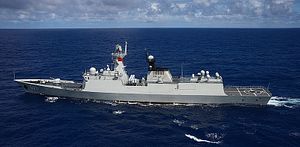As the violence in Yemen worsens, with Saudi Arabia leading air strikes against Houthi forces, China has joined a number of countries in evacuating personnel from the country. China sent a PLA Navy frigate, the Weifang, to Yemen to assist in evacuations. According to Xinhua, 449 Chinese citizens, plus six citizens of other countries, left Yemen Monday aboard the Weifang. An additional 122 Chinese citizens left on Sunday from the port of Aden, where Chinese warships were also used to help carry evacuees to safety.
According to Foreign Ministry spokesperson Hua Chunying, the navy vessels were diverted from their primary mission, conducting anti-piracy patrols in the Gulf of Aden, to conduct the evacuation. The 122 citizens who left Yemen on Sunday were taken to Djibouti, where the Chinese Embassy is helping arrange their return to China. The Chinese government “places great importance on the safety of Chinese citizens and entities in Yemen,” Hua said, noting that the evacuation operation began in earnest as the security situation “abruptly deteriorated” on Thursday.
As of Monday, “Chinese Ambassador Tian Qi and a necessary number of embassy staff are now holding their posts in Yemen,” Hua said, and were doing the work necessary to complete the evacuation of Chinese nationals. Xinhua noted that the embassy will remain open and “will continue to assist a small number of Chinese nationals who choose to stay in Yemen.” The U.S. and a number of other countries closed their embassies and evacuated staff back in February.
This evacuation is noteworthy as a rare example of the PLA Navy being used to protect Chinese citizens halfway across the globe. The first such operation came in 2011, when the PLA Navy helped evacuate some of the 35,000 Chinese citizens then living in Libya. As Gabe Collins and Andrew Erickson wrote at the time:
“The deployment of Xuzhou sets a major precedent because it marked the first time China has sent military assets to a distant part of the world to protect its citizens there. This is an historical first for China, and represents Beijing’s growing capability to conduct long-range operations that it was both incapable of doing, and unwilling to do, only a decade ago.”
China does not have as many interests in Yemen as it did in Libya, but has been active in expanding oil operations in the country in recent years. China is also involved in a number of construction and infrastructure development projects, including a $508 million project to expand ports in Aden and Mokha. The violence in Yemen jeopardizes these projects, providing a cautionary tale for Beijing’s plan to boost infrastructure investments and joint economic projects in a number of unstable regions along the planned Silk Road Economic Belt.
The fighting in Yemen could also have broader geopolitical consequences for Beijing. The Houthi rebels are allegedly backed by Iran; Iran has denied accusations that it is providing arms but openly admits to providing Houthis with humanitarian aid. Meanwhile, Saudi Arabia, Egypt, and the Gulf states are conducting air raids against the Houthis in support of Yemeni President Abdu Rabu Mansour Hadi.
Beijing is trying to deepen ties with both sides. China hopes that a nuclear deal with Iran will lead to reinvigorated economic and even defense ties. Meanwhile, Beijing has long considered Egypt and Saudi Arabia two of its most important Middle Eastern partners; Xi plans to visit both countries this April. It will take careful balancing on China’s part not to get dragged into the conflict between the two sides, both of which will doubtless want Chinese statements that support their position.

































